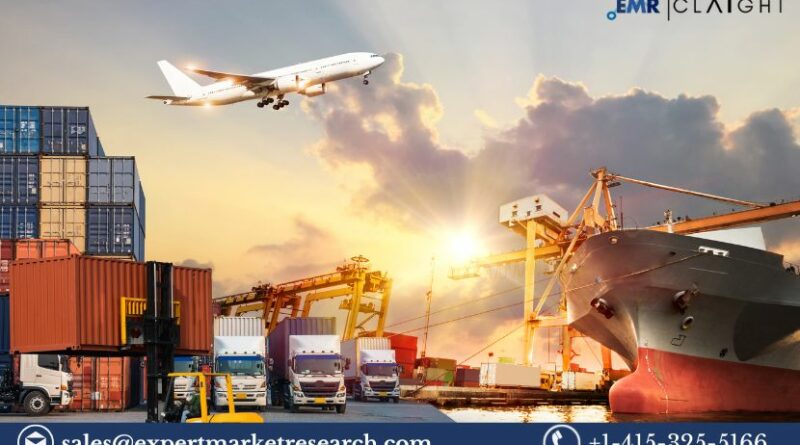Latin America logistics market Size, Share, Trends and Forecast | 2034
Latin America logistics market Outlook
According to the report by Expert Market Research (EMR), the Latin America logistics market size achieved a value of USD 633.81 billion in 2024. Driven by the increasing demand for e-commerce, the expanding industrial sector, and the rising need for supply chain optimisation, the market is projected to grow at a compound annual growth rate (CAGR) of 6.0% between 2025 and 2034, reaching a value of USD 1,074.84 billion by 2034.
Logistics in Latin America is an essential sector that connects producers, manufacturers, and consumers, facilitating the smooth flow of goods within the region and internationally. The logistics industry encompasses transportation, warehousing, distribution, and supply chain management, playing a pivotal role in supporting regional trade, economic development, and business efficiency. As Latin America continues to experience significant industrialisation, urbanisation, and digital transformation, the logistics sector is expected to remain a cornerstone of economic growth.
Key Drivers
Several factors are contributing to the growth of the Latin America logistics market. The rapid expansion of e-commerce in the region is one of the main drivers. With a population of over 650 million people, Latin America offers an immense consumer market that has seen an increased shift towards online shopping in recent years. E-commerce platforms, such as Mercado Libre, Amazon, and various local players, have spurred the need for sophisticated logistics solutions, including last-mile delivery services, warehousing, and real-time tracking systems.
The rise of consumer demand for quick, reliable, and cost-effective delivery services has led to significant investments in logistics infrastructure. Companies are increasingly focused on developing efficient distribution networks that can handle the complexities of e-commerce, such as small package sizes, fast delivery times, and enhanced customer experiences. The growing demand for just-in-time delivery and same-day shipping has further accelerated the need for technological advancements and improvements in supply chain management.
Another critical factor driving the logistics market is the industrial and manufacturing sector in Latin America. Countries like Brazil, Mexico, and Argentina have become key players in automotive, mining, and agriculture industries, which rely heavily on efficient logistics networks for the transportation of goods. As these sectors continue to expand, the demand for reliable transportation and warehousing solutions increases, further boosting the logistics market.
Urbanisation in Latin America also plays a significant role in shaping the logistics landscape. The rapid growth of cities, particularly in countries like Brazil, Mexico, and Colombia, has increased the need for more advanced transportation systems and infrastructure to meet the demands of urban populations. As cities become more densely populated, there is greater pressure on logistics providers to deliver goods quickly and efficiently, especially in metropolitan areas. The demand for urban logistics solutions, such as micro-distribution centers and urban warehouses, is on the rise as businesses look to serve the growing population of consumers in urban centers.
Get a Free Sample Report with Table of Contents@ https://www.expertmarketresearch.com/reports/latin-america-logistics-market/requestsample
Technological Advancements and Innovations
Technological advancements are transforming the Latin America logistics market, making supply chains more efficient, transparent, and scalable. Key innovations, such as automation, artificial intelligence (AI), the Internet of Things (IoT), and blockchain, are improving the overall logistics experience in the region.
Automation in warehouses is one of the most significant trends, helping businesses manage inventories, improve order picking accuracy, and reduce operational costs. Automated systems, including robotic arms, drones, and automated guided vehicles (AGVs), are increasingly being adopted to speed up the movement of goods within warehouses, reducing reliance on manual labor and improving operational efficiency.
AI and machine learning algorithms are also playing a vital role in optimising logistics operations. These technologies allow businesses to predict demand fluctuations, optimise routing and delivery schedules, and enhance fleet management. By analysing vast amounts of data, AI helps logistics providers make real-time decisions, improving delivery times and reducing costs. As businesses in Latin America continue to embrace digitalisation, AI is expected to become an integral part of logistics management, driving further growth in the market.
IoT is another key enabler in the logistics sector. The ability to track goods and shipments in real time has revolutionised the industry, allowing logistics companies to monitor the condition, location, and status of goods at every step of the supply chain. IoT-enabled devices, such as RFID tags and GPS sensors, provide valuable data that helps logistics providers optimise routes, monitor temperature-sensitive goods, and improve customer satisfaction through real-time delivery updates.
Blockchain technology is also making its way into logistics, helping to enhance transparency and security in the supply chain. Blockchain enables secure, traceable transactions and can be used to verify the authenticity of goods, reduce fraud, and streamline payment processes. As businesses in Latin America increasingly focus on improving supply chain transparency and efficiency, blockchain is expected to become more widely adopted in the region.
Latin America logistics market Segmentation
The global pulp and paper market can be divided based on type, transportation mode, end user and region.
Market Breakup by Model Type
- 1 PL
- 2 PL
- 3 PL
- Others
Market Breakup by Transportation Mode
- Roadways
- Seaways
- Railways
- Airways
Market Breakup by End User
- Manufacturing
- Consumer Goods and Retail
- Food and Beverages
- IT Hardware and Telecom
- Healthcare
- Chemicals
- Construction
- Automotive
- Oil and Gas
- Others
Market Breakup by Region
- Brazil
- Mexico
- Argentina
- Others
Competitive Landscape
Some of the major players explored in the report by Expert Market Research are as follows:
- FedEx Corporation
- United Parcel Service, Inc.
- Schenker AG
- C.H. Robinson Worldwide Inc.
- Deutsche Post AG
- DSV A/S
- CMA CGM Group (CEVA Logistics SA)
- Kuehne + Nagel International AG
- Nippon Express Co., Ltd.
- Expeditors International of Washington, Inc.
- Kintetsu World Express Inc.
- A.P. Møller – Mærsk A/S
- Others
Challenges and Restraints
While the Latin America logistics market offers significant growth opportunities, there are several challenges that the sector must overcome. Infrastructure limitations and inefficiencies in transportation networks remain major obstacles to the growth of the market. Despite recent improvements in road, rail, and port infrastructure, the logistics sector still faces significant challenges related to poor road conditions, congestion, and lack of investment in key areas. These issues contribute to higher transportation costs, delays, and inefficiencies, which ultimately impact businesses and consumers.
Moreover, regulatory challenges and the complexity of cross-border trade in Latin America can create hurdles for logistics providers. The region consists of a diverse group of countries with different trade policies, customs regulations, and tax laws, which can complicate logistics operations, especially for international shipments. Navigating these regulatory complexities requires businesses to invest in compliance systems and local expertise to ensure smooth and timely deliveries.
Security concerns are another factor affecting the Latin America logistics market. Cargo theft and hijacking are prevalent in certain regions, particularly in Brazil, Mexico, and Argentina. Logistics providers must implement robust security measures, including tracking systems, secure transportation methods, and insurance, to mitigate the risks associated with cargo theft. This challenge increases the overall cost of logistics and requires ongoing investment in security solutions.
Media Contact:
Company Name: Claight Corporation
Contact Person: George buttler, Corporate Sales Specialist – U.S.A.
Email: sales@expertmarketresearch.com
Toll Free Number: +1-415-325-5166 | +44-702-402-5790
Address: 30 North Gould Street, Sheridan, WY 82801, USA
Website: http://www.expertmarketresearch.com
Aus Site: https://www.expertmarketresearch.com.au




